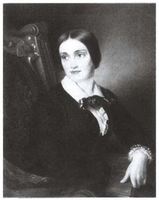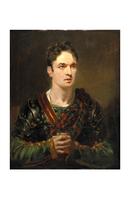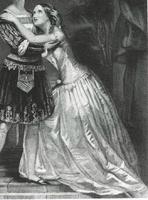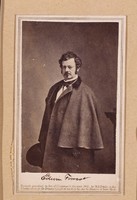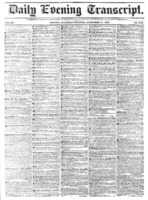Leman's Memories of an Old Actor (1886)
Dublin Core
Title
Leman's Memories of an Old Actor (1886)
Subject
Actors and Actresses
Actors and Actresses--US American
Actors and Actresses--English
Cushman, Charlotte Saunders, 1816-1876
Macready, William Charles
Relationships--Networks
Relationships--Patrons and Protégés
Fame
Gender Norms
Gossip--Published
Description
Creator
Leman, Walter Moore, 1810-
Publisher
A. Roman Co.
Date
1886
Type
Reference
Auto/Biography Item Type Metadata
Text
"personal acquaintance with Miss Cushman, it was perhaps the glamour of first impression" (12)
"This season was notable for a brilliant engagement of Miss Charlotte Cushman, whose acting of 'Lady
Macbeth' and 'Meg Merriles,' impressed the public most profoundly." (207)
gossip about William Rufus Blake:
"In private Mr. Blake was a delightful companion. He was not especially noted for prudence in money matters; he loved life and loved to en joy it, and loved to see others enjoy it. If he had been a millionaire he would have spent his income like a prince. When he could command money he spent it like a gentleman, and, truth to say, he sometimes spent it like a gentleman when he had none to spend (save in expectancy). From the first he took a great fancy to me, and in after years would pleasantly recall the days when he first knew 'Walter,' in Boston. He was stage manager of the Walnut St. Theatre in Philadelphia some years later, when I was attached to the company, and it was his especial delight to have a Sunday dinner-party with the young actors around him, and I was always an invited guest. He was full of fun, and kept us all in a roar of merriment. 'Why?' he asked on one occasion, 'why do some of these newspa per fellows sometimes say that I'm not a good actor? Ask Charlotte.' —This was said with a chuckle, referring to Charlotte Cushman, who had been his predecessor in the stage management, and with whom his relations had been almost belligerent —'She knows; she'll say it's because I'm a Blue nose.' He was born in Halifax, N. -S. 'Ask Walter, here; he'll tell you what they think in Boston. He'll tell you that there I was the pet of the ladies —the pride of the Irishtocracy and the idol of the pox vopuli." And then came out that merry laugh, whose influence no one could resist." (23-24)
about Cushman's career:
"In the following April, Boston witnessed the first musical efforts of a lady who afterwards be came the acknowledged queen of tragedy, with no rival near her throne—Miss Charlotte Cushman. She was a native of Boston, but for some years previous had been a resident of the adjoining town of Charlestown. I remember her well as a girl, and a vocalist in the choir of the Bulfinch street church. Miss Cushman appeared as the " Countess," in the opera of the " Marriage of Figaro." In the year following, she appeared as " Lady Macbeth," and surprised the public, who had hitherto known her only as a singer. Miss Cushman had a fondness for male parts, and played at this time, " Fortunato Falcone,' 'Henry,' in 'Speed the Plough,' and 'Patrick,' in the 'Poor Soldier.' She might, perhaps, have become a great singer, had she not ruined a naturally fine voice by overtaxing it ; and it may truly be said that she became a great tragedienne by the force of circumstances. Miss Cushman's voice always retained a coarse and harsh tone, the probable result of her over-strained vocal ef forts. Breaking down as an opera-singer, in New Orleans, she became the pupil of Mr. Barton, an actor of the Macready school, and made an instantaneous success as 'Lady Macbeth,' a part to which she had devoted the most careful study. Subsequently she supported Macready; his influence assisted materially in her rapid rise to fame and fortune, and her constant professional association with him, no doubt, led to a certain mannerism and tone that made her appear a female copy of that gentleman, pure and simple. There was little of feminine softness in anything Miss Cushman did upon the stage, but there was a perfect mine of depth and power. She loved society and fame and money, and she had them all." (121-122)
gossip about Macready:
"with all the members of the company. Miss Charlotte Cushman played the 'Queen' to Macready's 'Hamlet,' and he was so well pleased with the lady, that he chose her as his female support in his subsequent engagements, and thus made the way to her London career feasible and plain. Mr. Blake, knowing Mr. Macready's peculiarities, was especially anxious that all should go right while Mr. Macready was with us, and in deed all went very well, even to the satisfaction on the whole of Mr. Macready himself, although there were one or two little accidents during that memorable engagement, that to Kean, or Booth, or even Forrest, would have been as nothing, but came very near upsetting Mr. Macready. One of these I have a right to mention, as I was the innocent delinquent. It occurred towards the close of the engagement, when "Hamlet" was repeated. But first I will allude to the experience of my friend Mr. William Wheatley, who played the supporting seconds to the star. It happened almost every night that on the fall of the curtain, Mr. Macready would send his dresser to the stage manager with a desire that Mr. So-and-So, whoever it might chance to be, should be sent to Mr. Macready's dressing-room, and, with more or less of fear and trembling, the actors would go to hear what Mr. Macready had to say; and from the expression on their faces when they emerged, the inference was drawn that Macready's remarks had not been over complimentary. Mr. Blake, as I have said, was extremely anxious that everyone should do all in his or her power to please the exacting star, and before the rising of the curtain would come into the green-room and say: 'Now, gentlemen and ladies, let us all take care to have everything go right with Mac.; be very particular that everything is done exactly as it was rehearsed'—and when the actors came forth from Macready's room, would meet them with a satiric smile on his handsome face, and ask what 'Mac' had said, assuring them that, 'of course, Mr. Macready had only sent for them to compliment their performance.' Mr. Wheatley generally escaped these interviews, but on one evening Blake came running into the green-room with: 'Wheatley, Mac wants you—it's your turn now;' and Wheatley went as desired, to the great man's room ; he remained there an unusually long time, and on coming out, Blake, who had all the time been on the watch, wanted to know what kept him so long, and what Mac had been saying to him. From Mr. Wheatley's constrained manner and unpleased look, it was quite apparent that the interview had not been altogether satisfactory ; but he got away from Blake as quickly as possible by saying, with an enforced tone of cheerfulness, that 'he had a delicious half-hour' with Mr. Macready. Blake gave a chuckle, which bespoke his misdoubt of Wheatley's report; and on the following evening, the 'Hamlet' night, when dressed for 'Polonius,' came into the green-room, and in his inimitable manner, looking at Wheatley, wondered who would have the delicious half-hour with Mac to-night." (170-172)
"In after years he made a very laughable story of that interview, and confessed that his friend Leman, didn't have all of the delicious half-hour to himself. In reality, I do not think that, apart from Mr. Macready, anyone in the house noticed that Mr. Blake chanced to put his hand on the back of the king's chair, or knew that the king drew a foil instead of a sword. It was a ridiculous fuss about nothing. Many stories were in vogue during Mr. Macready's professional visits to America, of annoyances to which he was subjected, in one of which, Mr. Decius Rice, the "Jupiter " who spoiled Sinclair's satin dress, figured." (175)
about Cushman's ambitions:
"Miss Charlotte Cushman withdrew from the theatre, I think, before the close of the season— there was always a something—which if not belligerency was at least armed neutrality between Miss Cushman and Mr. Blake. Preeminent as the lady was, even at that time, in tragic power, she was not so happy in comedy; and she played all the best of it; indeed, she played the best of everything in the female line. In all the comedy scenes between the lady and gentleman, Blake had the 'call' with the audience. Miss Cushman possessed a large amount of personal ambition, and never missed a chance to obtain or wield a social sway. Her sister had become a member of a certain female organization presumably in furtherance of this object, and Blake would come into the green room and make ludicrous inquiries about the prospects of the 'organization for promoting the entrance of actresses into the upper ten sphere,' and ask about the income and prospects of 'the female sacred button-hole society.' Miss Cushman would give Blake a very meaning look at such times. I think that it would have been almost impossible for them to dwell in professional unity, and no doubt the separation was agreeable to both." (179-180)
"This season was notable for a brilliant engagement of Miss Charlotte Cushman, whose acting of 'Lady
Macbeth' and 'Meg Merriles,' impressed the public most profoundly." (207)
gossip about William Rufus Blake:
"In private Mr. Blake was a delightful companion. He was not especially noted for prudence in money matters; he loved life and loved to en joy it, and loved to see others enjoy it. If he had been a millionaire he would have spent his income like a prince. When he could command money he spent it like a gentleman, and, truth to say, he sometimes spent it like a gentleman when he had none to spend (save in expectancy). From the first he took a great fancy to me, and in after years would pleasantly recall the days when he first knew 'Walter,' in Boston. He was stage manager of the Walnut St. Theatre in Philadelphia some years later, when I was attached to the company, and it was his especial delight to have a Sunday dinner-party with the young actors around him, and I was always an invited guest. He was full of fun, and kept us all in a roar of merriment. 'Why?' he asked on one occasion, 'why do some of these newspa per fellows sometimes say that I'm not a good actor? Ask Charlotte.' —This was said with a chuckle, referring to Charlotte Cushman, who had been his predecessor in the stage management, and with whom his relations had been almost belligerent —'She knows; she'll say it's because I'm a Blue nose.' He was born in Halifax, N. -S. 'Ask Walter, here; he'll tell you what they think in Boston. He'll tell you that there I was the pet of the ladies —the pride of the Irishtocracy and the idol of the pox vopuli." And then came out that merry laugh, whose influence no one could resist." (23-24)
about Cushman's career:
"In the following April, Boston witnessed the first musical efforts of a lady who afterwards be came the acknowledged queen of tragedy, with no rival near her throne—Miss Charlotte Cushman. She was a native of Boston, but for some years previous had been a resident of the adjoining town of Charlestown. I remember her well as a girl, and a vocalist in the choir of the Bulfinch street church. Miss Cushman appeared as the " Countess," in the opera of the " Marriage of Figaro." In the year following, she appeared as " Lady Macbeth," and surprised the public, who had hitherto known her only as a singer. Miss Cushman had a fondness for male parts, and played at this time, " Fortunato Falcone,' 'Henry,' in 'Speed the Plough,' and 'Patrick,' in the 'Poor Soldier.' She might, perhaps, have become a great singer, had she not ruined a naturally fine voice by overtaxing it ; and it may truly be said that she became a great tragedienne by the force of circumstances. Miss Cushman's voice always retained a coarse and harsh tone, the probable result of her over-strained vocal ef forts. Breaking down as an opera-singer, in New Orleans, she became the pupil of Mr. Barton, an actor of the Macready school, and made an instantaneous success as 'Lady Macbeth,' a part to which she had devoted the most careful study. Subsequently she supported Macready; his influence assisted materially in her rapid rise to fame and fortune, and her constant professional association with him, no doubt, led to a certain mannerism and tone that made her appear a female copy of that gentleman, pure and simple. There was little of feminine softness in anything Miss Cushman did upon the stage, but there was a perfect mine of depth and power. She loved society and fame and money, and she had them all." (121-122)
gossip about Macready:
"with all the members of the company. Miss Charlotte Cushman played the 'Queen' to Macready's 'Hamlet,' and he was so well pleased with the lady, that he chose her as his female support in his subsequent engagements, and thus made the way to her London career feasible and plain. Mr. Blake, knowing Mr. Macready's peculiarities, was especially anxious that all should go right while Mr. Macready was with us, and in deed all went very well, even to the satisfaction on the whole of Mr. Macready himself, although there were one or two little accidents during that memorable engagement, that to Kean, or Booth, or even Forrest, would have been as nothing, but came very near upsetting Mr. Macready. One of these I have a right to mention, as I was the innocent delinquent. It occurred towards the close of the engagement, when "Hamlet" was repeated. But first I will allude to the experience of my friend Mr. William Wheatley, who played the supporting seconds to the star. It happened almost every night that on the fall of the curtain, Mr. Macready would send his dresser to the stage manager with a desire that Mr. So-and-So, whoever it might chance to be, should be sent to Mr. Macready's dressing-room, and, with more or less of fear and trembling, the actors would go to hear what Mr. Macready had to say; and from the expression on their faces when they emerged, the inference was drawn that Macready's remarks had not been over complimentary. Mr. Blake, as I have said, was extremely anxious that everyone should do all in his or her power to please the exacting star, and before the rising of the curtain would come into the green-room and say: 'Now, gentlemen and ladies, let us all take care to have everything go right with Mac.; be very particular that everything is done exactly as it was rehearsed'—and when the actors came forth from Macready's room, would meet them with a satiric smile on his handsome face, and ask what 'Mac' had said, assuring them that, 'of course, Mr. Macready had only sent for them to compliment their performance.' Mr. Wheatley generally escaped these interviews, but on one evening Blake came running into the green-room with: 'Wheatley, Mac wants you—it's your turn now;' and Wheatley went as desired, to the great man's room ; he remained there an unusually long time, and on coming out, Blake, who had all the time been on the watch, wanted to know what kept him so long, and what Mac had been saying to him. From Mr. Wheatley's constrained manner and unpleased look, it was quite apparent that the interview had not been altogether satisfactory ; but he got away from Blake as quickly as possible by saying, with an enforced tone of cheerfulness, that 'he had a delicious half-hour' with Mr. Macready. Blake gave a chuckle, which bespoke his misdoubt of Wheatley's report; and on the following evening, the 'Hamlet' night, when dressed for 'Polonius,' came into the green-room, and in his inimitable manner, looking at Wheatley, wondered who would have the delicious half-hour with Mac to-night." (170-172)
"In after years he made a very laughable story of that interview, and confessed that his friend Leman, didn't have all of the delicious half-hour to himself. In reality, I do not think that, apart from Mr. Macready, anyone in the house noticed that Mr. Blake chanced to put his hand on the back of the king's chair, or knew that the king drew a foil instead of a sword. It was a ridiculous fuss about nothing. Many stories were in vogue during Mr. Macready's professional visits to America, of annoyances to which he was subjected, in one of which, Mr. Decius Rice, the "Jupiter " who spoiled Sinclair's satin dress, figured." (175)
about Cushman's ambitions:
"Miss Charlotte Cushman withdrew from the theatre, I think, before the close of the season— there was always a something—which if not belligerency was at least armed neutrality between Miss Cushman and Mr. Blake. Preeminent as the lady was, even at that time, in tragic power, she was not so happy in comedy; and she played all the best of it; indeed, she played the best of everything in the female line. In all the comedy scenes between the lady and gentleman, Blake had the 'call' with the audience. Miss Cushman possessed a large amount of personal ambition, and never missed a chance to obtain or wield a social sway. Her sister had become a member of a certain female organization presumably in furtherance of this object, and Blake would come into the green room and make ludicrous inquiries about the prospects of the 'organization for promoting the entrance of actresses into the upper ten sphere,' and ask about the income and prospects of 'the female sacred button-hole society.' Miss Cushman would give Blake a very meaning look at such times. I think that it would have been almost impossible for them to dwell in professional unity, and no doubt the separation was agreeable to both." (179-180)
Location
San Francisco
Geocode (Latitude)
37.7790262
Geocode (Longitude)
-122.4199061
Provenance
Hathi, http://hdl.handle.net/2027/hvd.hwwj4v, accessed 01/28/2020
Social Bookmarking
Geolocation
Collection
Citation
Leman, Walter Moore, 1810-, “Leman's Memories of an Old Actor (1886),” Archival Gossip Collection, accessed April 19, 2024, https://www.archivalgossip.com/collection/items/show/143.


